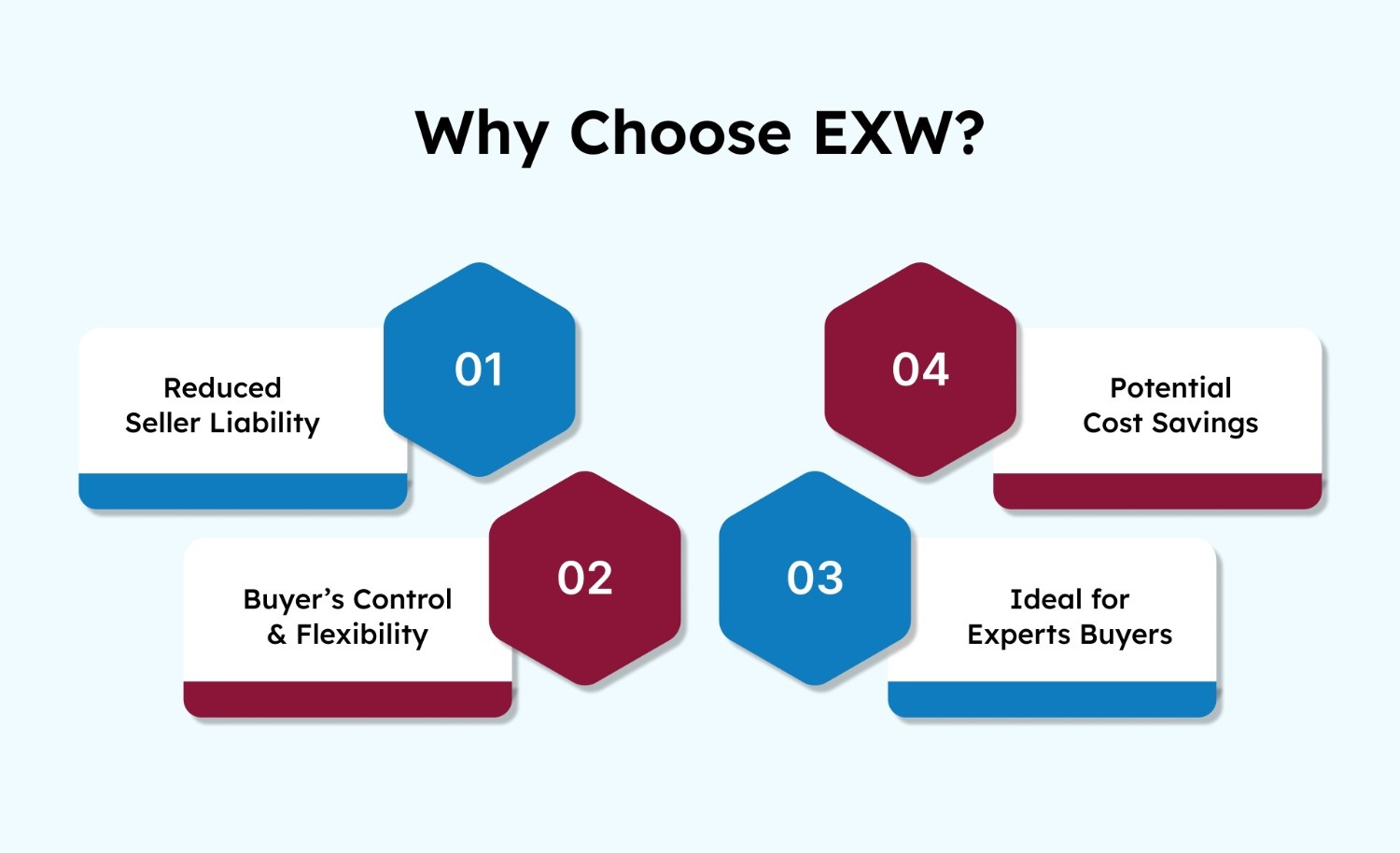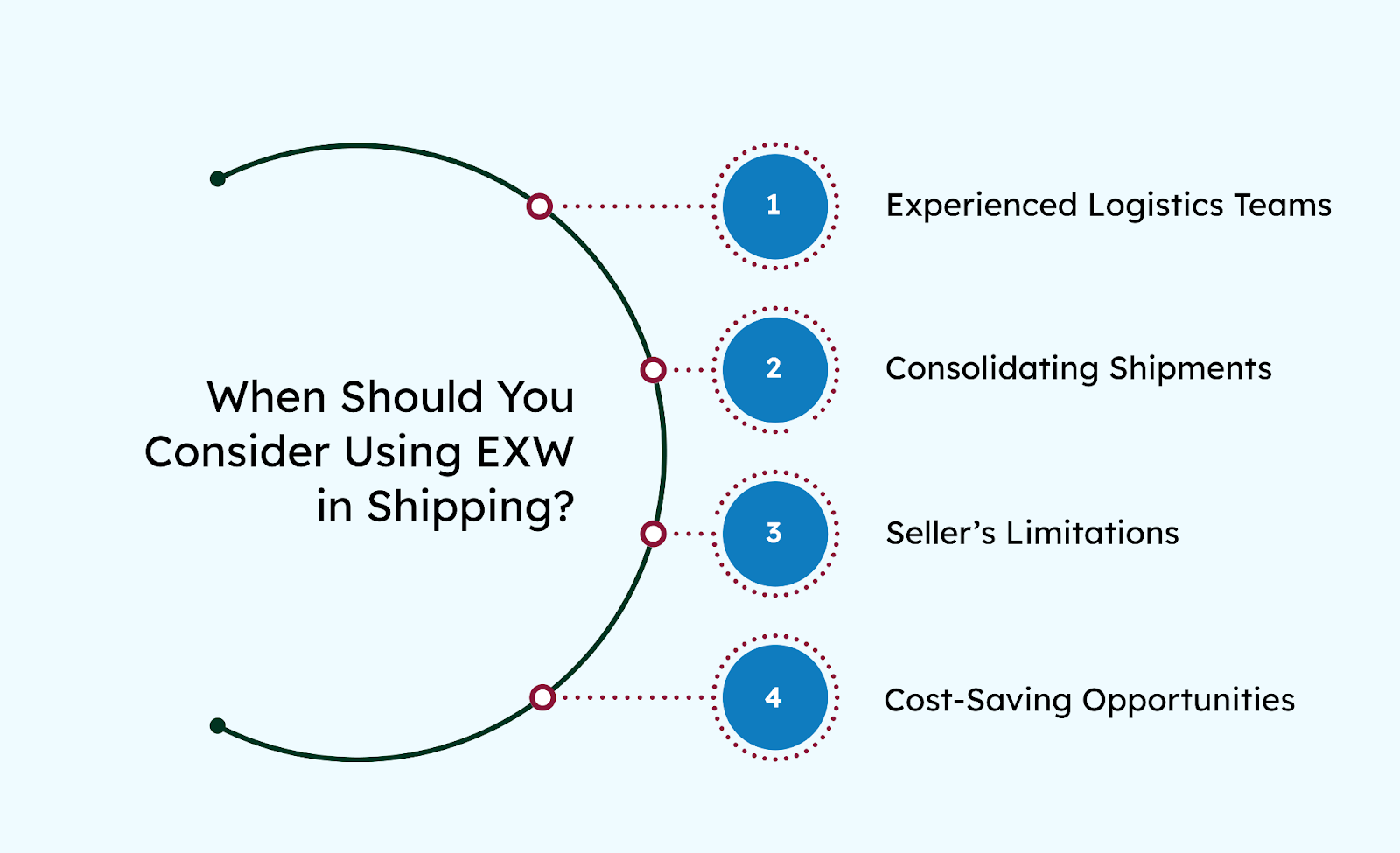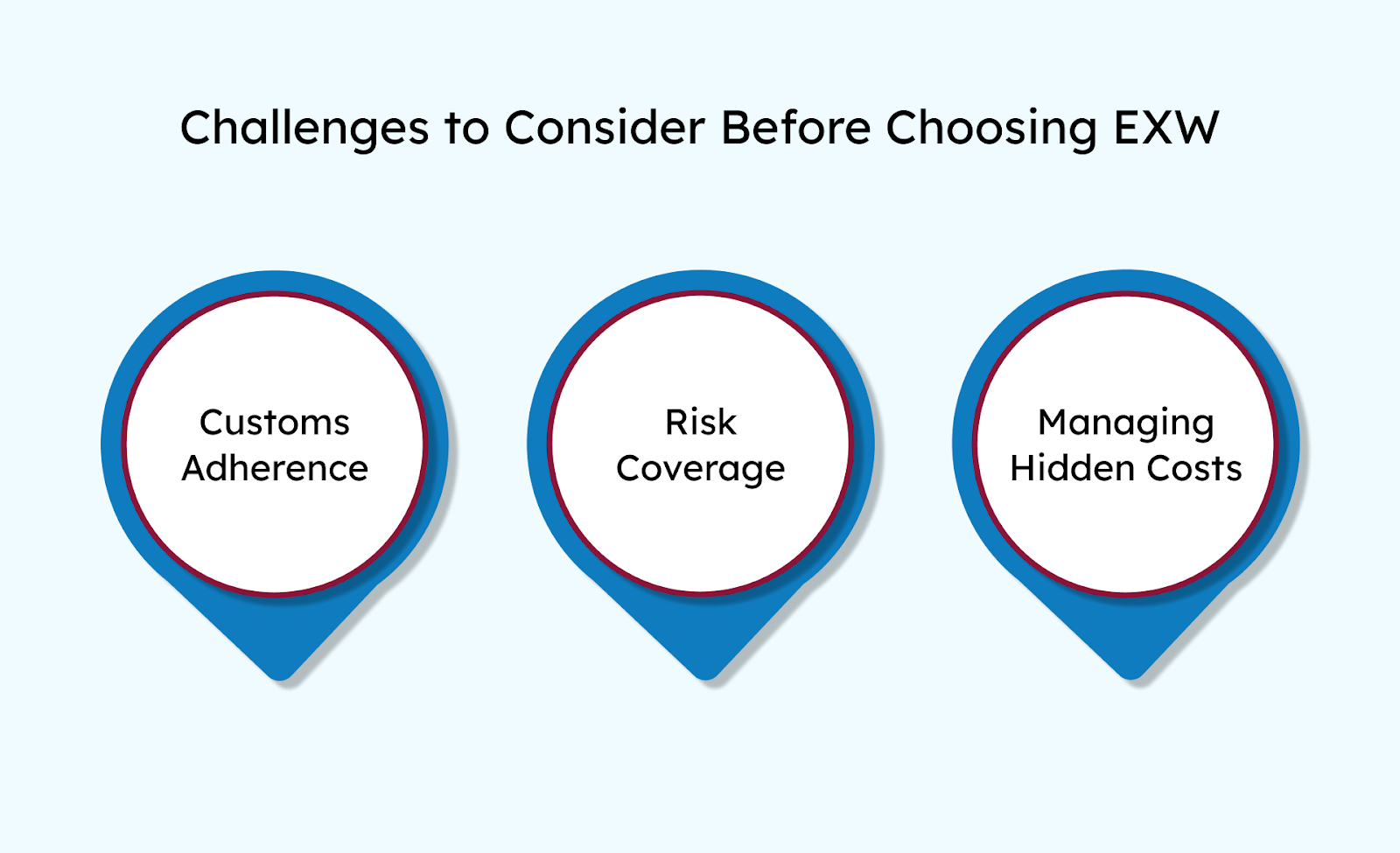In international shipping, managing logistics, controlling costs, and mitigating risks are constant challenges. Companies often struggle with understanding complex shipping terms that impact their bottom line. One such term that can add complexity is 'Ex Works' (EXW). While this term can offer advantages, it also places a significant burden on the buyer, requiring them to take on full responsibility for shipping and associated costs. Understanding how EXW works and whether it fits your business model is crucial for optimising your shipping strategy.
Here's everything you need to understand about what Ex works means and how it impacts your shipping strategy.
What Ex Works (EXW) Means in Shipping
Ex Works (EXW) is one of the 11 standardised Incoterms published by the International Chamber of Commerce (ICC), making it one of the most commonly used terms in international trade. With EXW, the seller's job is done once the goods are ready for pickup at their location or another agreed-upon spot. After that, the buyer takes over, handling all the transportation, logistics, and costs, as well as any risks, until the goods reach their final destination.
Example of Ex Works (EXW)
A seller in Qatar agrees to sell goods to a buyer in Germany under EXW terms. The seller makes the goods available for pickup at their warehouse in Doha. From that point, the buyer handles all logistics, export paperwork, shipping, customs, and delivery. All costs and risks after pickup fall on the buyer.
Why Choose EXW?

- Minimised Seller Responsibility: EXW places minimal logistical responsibility on the seller, requiring only the availability of goods for pickup and basic documentation.
- Buyer’s Control and Flexibility: Buyers can control the shipping process, including selecting carriers and negotiating rates, allowing for tailored logistics management.
- Best for Experienced Buyers: Ideal for buyers with established logistics networks or experience in international shipping, EXW allows greater oversight and consolidation of shipments.
- Potential Cost Savings: If the buyer manages logistics well, EXW can reduce costs by using cheaper shipping rates and avoiding extra handling fees.
For experienced buyers, Ex Works means having full control over the shipping process, but it also comes with a higher level of responsibility. Buyers must be prepared to handle everything from customs clearance and transport insurance to managing any risks. This makes understanding the distribution of duties under EXW even more critical, as knowing who’s responsible for what helps streamline the process.
Read: What is Customs Clearance: Process and Tips
What’s Included in the EXW Price?
When using the Ex Works (EXW) Incoterm, the final cost includes all the logistics expenses the buyer takes on after picking up the goods from the seller’s location. These typically include:
- Local transportation: Cost to move goods from the seller’s warehouse to the port or airport of origin.
- Origin terminal charges: Fees for handling the cargo at the origin terminal, including storage and processing.
- Loading charges: Expenses for loading the goods onto the selected mode of transport (ship, air, or truck).
- Main freight charges: Shipping cost based on the transport mode (air, sea, or land).
- Customs duties and documentation: Charges for both export clearance and import clearance at the destination country.
- Destination charges: Fees at the arrival terminal for unloading, handling, and local delivery.
- Final-mile transportation: Cost to transport goods from the destination port or airport to the buyer’s warehouse.
Since the buyer is responsible for all logistics costs under EXW, understanding how these duties are divided is essential for accurate planning and cost control. Let’s break down how responsibilities are distributed between the buyer and seller under EXW.
Understanding the Distribution of Duties under EXW
To effectively manage EXW, it's crucial to understand the responsibilities of both the buyer and the seller. Clarity on these roles helps streamline the process and ensures smoother logistics management. By knowing who handles what, you can better manage risks, avoid delays, and optimise the shipping process.
Seller’s Duties:
- Goods Availability: The seller is responsible for making the goods available at their premises (or another agreed location). They must ensure the goods are ready for pickup by the buyer or their designated agent.
- Export Documentation: The seller must provide the necessary documentation showing that the goods are made available for pickup, such as invoices and proof of delivery. However, they are not responsible for arranging export customs clearance.
Buyer’s Duties:
- Loading and Transport: The buyer takes on the task of loading the goods onto transport and handling all logistics from the seller’s premises onward.
- Customs and Documentation: The buyer must ensure compliance with both export and import regulations, including customs registration, declaration, and payment of any applicable duties and taxes.
- Insurance: The buyer assumes the risk of loss or damage to the goods once they are made available for pickup. They are also responsible for securing transportation insurance if desired.
- Final Delivery: The buyer is responsible for organising the final leg of the transportation, ensuring that the goods reach their final destination.
Understanding the distribution of duties under EXW is crucial for ensuring a smooth shipping process. By clearly defining the responsibilities of both the buyer and the seller, businesses can avoid misunderstandings and manage risks more effectively. With these duties in mind, it’s also important to consider the pros and cons of EXW so buyers can weigh the benefits and challenges before making a decision.
What Buyers Should Know: The Pros and Cons of EXW
EXW can be an appealing option for buyers, offering control over logistics, but like any shipping term, it comes with its own set of advantages and challenges. It's essential to weigh these pros and cons to determine whether EXW aligns with your shipping needs, resources, and level of expertise. Making the right choice can streamline your process and help avoid potential pitfalls down the road.
Advantages:
- Complete Control: With EXW, buyers can take full control over the logistics process, ensuring that they select the best routes, carriers, and shipping methods.
- Potential for Cost Savings: Buyers with an established logistics network can potentially reduce shipping costs by negotiating better rates or using their own in-house transportation.
- Transparency: Buyers have visibility over all logistics processes, which allows for better planning and forecasting.
Disadvantages:
- Higher Risk: The buyer assumes all risks from the moment the goods are made available, meaning any damage, loss, or delay during transportation is their responsibility.
- Increased Complexity: Managing international shipping, customs clearance, and transportation requires specialised knowledge and can be time-consuming.
- Unexpected Costs: Buyers may encounter unforeseen expenses, such as storage fees, customs delays, or higher transportation costs than anticipated.
Understanding what Ex Works means allows buyers to recognise the level of control they gain, but it also brings to light the risks and responsibilities they must manage. Considering both the benefits and drawbacks of EXW helps ensure that buyers are fully prepared for the logistics involved. Now that we've covered the pros and cons, let's explore when EXW is the most suitable option for your shipping needs.
When Should You Consider Using EXW in Shipping?
EXW can be a great option in specific situations, especially if the buyer has the know-how and resources to manage the complexities of international shipping. If you’re someone who wants full control over the logistics process, EXW might be the way to go. Let’s take a look at a few scenarios where choosing EXW could be the best choice.

- Experienced Logistics Teams: If your business has a dedicated logistics team with experience in managing international shipments, EXW can offer greater flexibility and control over the process.
- Consolidating Shipments: For businesses that are consolidating shipments from multiple suppliers, EXW allows the buyer to manage the logistics and ensure that the goods are transported efficiently from multiple sellers.
- Seller's Limitations: If the seller is unable to handle export procedures or customs clearance, EXW allows the buyer to manage the entire process, ensuring that the shipment moves smoothly from origin to destination.
- Cost-Saving Opportunities: If your business has access to cost-effective shipping solutions or is able to negotiate better rates with carriers, EXW provides an opportunity to reduce overall shipping expenses by taking control of the logistics process.
EXW can be a great option when buyers have the experience and resources to manage the complexities of shipping. It's ideal for those looking for full control over the process, especially when consolidating shipments or managing costs. However, before making your decision, it’s important to understand the challenges that come with EXW.
Challenges to Consider Before Choosing EXW
While Ex Works means full control for the buyer, it also brings the burden of managing all logistics, including customs clearance, transport insurance, and associated costs. If you're thinking about using EXW, it's essential to be aware of these potential obstacles to avoid unexpected delays, hidden costs, or complications in the shipping process. Being prepared can help you handle the challenges and ensure a smoother experience overall.

- Customs Compliance: Buyers must be familiar with the customs regulations in both the export and import countries. Any mistakes in customs declarations or failures to meet regulatory requirements can result in costly delays or penalties.
- Insurance and Risk Management: Under EXW, the buyer is responsible for insuring the goods during transit. However, the cost of insurance can vary greatly depending on the shipping method and the nature of the goods being shipped. Buyers should carefully consider the level of coverage needed.
- Managing Hidden Costs: Although EXW allows for cost control, there can be hidden costs, such as additional storage fees, handling charges, or unexpected delays in customs clearance. Buyers must factor in these costs when negotiating the price.
While EXW offers flexibility, it's important to be aware of the challenges that come with it, such as managing customs compliance and insurance. Being prepared for these hurdles can help ensure a smoother shipping experience. Now that we've covered the potential challenges, let's compare EXW with other popular Incoterms to understand how it stacks up against alternative options.
Comparing EXW with Other Popular Incoterms
Understanding how EXW compares with other Incoterms is crucial because the allocation of responsibilities between the buyer and seller can vary significantly. By comparing what Ex Works means with other common Incoterms, you can make more informed decisions based on your specific logistics needs. Knowing the differences can help you choose the best option to align with your shipping goals and ensure smoother transactions.
1. EXW vs. FCA (Free Carrier)
In FCA, the seller’s responsibility ends once the goods are handed over to a carrier or another party nominated by the buyer. Unlike EXW, FCA involves some seller responsibility for export customs clearance, though the buyer still handles the majority of the logistics.
FCA may be easier for buyers who want the seller to handle some export duties but still maintain control over the carrier selection.
2. EXW vs. FOB (Free On Board)
FOB places more responsibility on the seller, who must deliver goods onto a vessel nominated by the buyer. The risk and cost are transferred once the goods are loaded onto the ship, meaning the buyer has control once the goods are aboard.
While EXW gives the buyer full responsibility for the seller's premises, FOB offers more control for the buyer during the shipping process, particularly for sea freight.
With a clearer understanding of how EXW compares, let's dive into some frequently asked questions to clarify any remaining doubts about how EXW works in practice.
Take the Complexity out of EXW.
With Ex Works, you're responsible for everything after pickup, from international freight to customs and delivery. WareOne makes it easier by acting as your Importer of Record across the GCC. We handle documentation, HS code classification, duties, and clearance, so your cargo clears borders without delays. Whether you're shipping across the GCC, our on-ground logistics network ensures your goods arrive where they need to, without the usual stress. Need help navigating EXW? Get in touch with us today.
Final Thoughts
Ex Works (EXW) offers buyers maximum control over their shipments, but with that control comes full responsibility. From arranging international freight to handling customs, duties, and delivery, EXW is best suited for businesses with the experience and infrastructure to manage complex logistics.
Before choosing EXW, weigh the benefits of flexibility and cost savings against the challenges of risk, compliance, and coordination. A clear understanding of your duties, as well as those of your supplier, can help you avoid delays, reduce hidden costs, and run a tighter, more reliable shipping operation.
Shipping across the GCC? Explore more on our latest blogs.
.jpg)